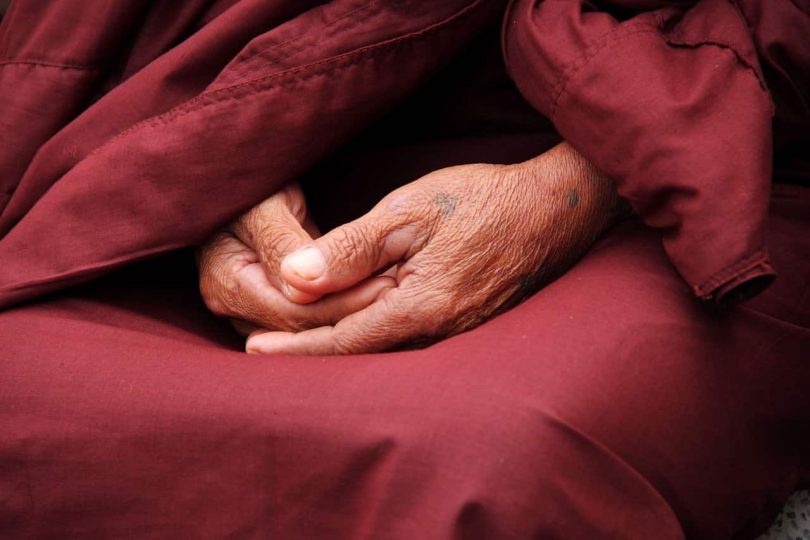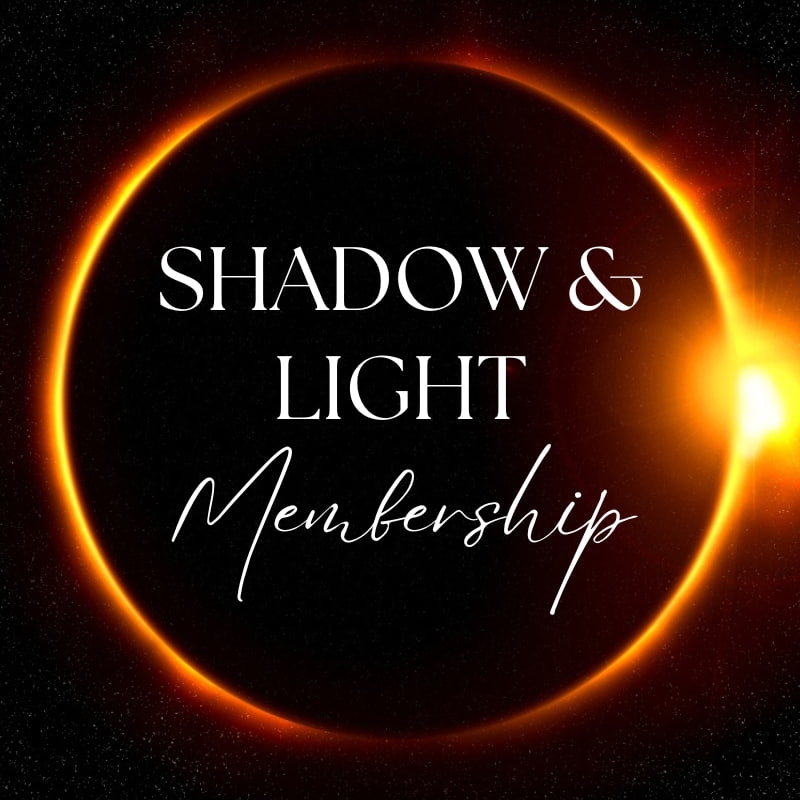Meditation isn’t enough, okay?
There, I said it.
Far from being the panacea we have all hoped for, meditation is undoubtedly a powerful tool – but it just doesn’t solve the deep-seated issues that most of us carry.

Spiritual Wanderer Course:
Being a lone wolf and a spiritual wanderer is a sacred calling in life – a unique and alchemical path of awakening. You don’t need to feel lost, alone, or stuck on your journey any more. It’s time to meet your soul’s deep needs for clarity, self-acceptance, and empowerment. Let us show you how …
In fact, no matter what spiritual practice/path you engage in, no matter what hallowed tool you hold close to your heart, it is lopsided, deformed, and misguided without some form of inner psychological work.
Our spiritual paths need an element of psychological exploration and healing, otherwise, they are prone to issues such as spiritual materialism, spiritual narcissism, denial, avoidance, repression, dissociation, disconnection, poor sense of self, and retraumatization. Ya hear me?
Like all things in life, spirituality needs to evolve beyond infantile, avoidant, repressive, and oppressive paradigms. We need to deepen our approach toward spiritual transformation, and that involves uniting the two worlds of spirituality and psychology.
Table of contents
What is Spiritual Psychology?

As its name suggests, spiritual psychology is a blend of spirituality and psychology and is the study of how the mind influences spiritual development (and vice versa).
Spiritual psychology is sometimes referred to as transpersonal psychology as it extends beyond the personal and into the metaphysical. Themes often explored in spiritual psychology include:
- Mental, emotional, or physical trauma and spiritual healing
- The phenomenon of soul loss
- Uniting the mind and heart
- Discovering one’s spiritual calling
- Understanding the meaning of life
- Releasing blocked energy
- Working through core wounds
- Inner child work and shadow work
- Moving through the dark night of the soul
- Gaining access to one’s True Nature
- … and so on
There’s an unlimited number of topics that spiritual psychology explores and can help you deepen your experience with – it all depends on what your needs are at the moment.
But Aren’t Psychology and Spirituality Totally Incompatible?

When we quickly glance at the two fields of psychology and spirituality, they kind of look like two awkward strangers trying to talk to each other in completely foreign languages.
Dissolve the shadows that obscure your inner Light in this weekly email-based membership! Perfect for any soul seeker serious about practicing ongoing shadow work and self-love.
But actually, psychology and spirituality have a lot more in common than you might think.
In fact, the very word “psychology” comes from the root words psykhē meaning “breath, spirit, soul” and logia meaning “study of.” Therefore, the original meaning of psychology was the study of the soul. That definition is a far cry from the secularized clinical mind-centered psychology of this modern world!
Furthermore, psychology and spirituality mirror what we all possess within: a mind and soul (or spirit). Why, then, should they be separate? What benefit is it to keep these two innate aspects of us – the psyche and the spirit – apart?
As poet Mark Nepo writes,
… just as the depth and surface of the sea are inseparable, so too are the spirit and psychology of each human being. It is our deep-sounding, untamed currents that cause us to rise and swell, dip and crash. Yet that base of spirit remains unaffected by the storms that churn up the surface. It obeys a deeper order. Still, we as beings living in the world are always subject to both: the depth and the surface, our spirit and our psychology.
Just like the ocean, there is a depth and surface within us. In other words, we all possess a horizontal axis (our earthly self) and a vertical axis (our spiritual Self). Our horizontal self is focused on doing and becoming, and our vertical Self is focused on being and letting go.
We need to honor both aspects if we are to live a life of freedom, balance, and wholeness.
Why Psychology By Itself is Not Enough

Certainly, psychology is useful. We have all undergone some level of toxic social conditioning, trauma, and core wounds. Therefore, it’s crucial that we explore and work through these issues so that we can live more peaceful lives (and not infect our children, family, friendships, and work connections with our unresolved shit).
But psychology by itself is not enough. When psychology lacks spirituality it is sterile, self-absorbed, and empty. Yes, we may become more functional members of society, but there is a noticeable lack of depth, zest, and deeper engagement with life.
Furthermore, we might even ask, at what point are we ever really “healed” of all our junk? Psychology is very much like a rabbit hole: the further you dig, the more there is to find. And the more psychological sewage you find, the more likely you are to begin pathologizing yourself, getting stuck within the stories created by the mind in an endless loop of doom. (And if you’re extra “lucky,” some kind of professional will do that for you, further reinforcing and legitimizing your mental misery!)
In this sense, psychology can become a poison and cure at the same time. On one hand, it points out all the ways in which we are “not good enough, emotionally unstable, wounded, and not well-adjusted enough” etc., etc. And on the other, it gives us all the tools to help us “get over” these pathologies (or give us the idea that we’re getting over them – until we use psychology to condemn ourselves again!).
Would you like to save this?
Your information will never be shared.
At what point is there ever a reprieve? At what point is there ever true self-acceptance or even transcendence beyond the limited ego (which, after all, is a complete illusion)? At what point does psychology end and spirituality begin?
Even Jung understood the paradox of psychology and the self-improvement trap, writing:
Now and then it happened in my practice that a patient grew beyond himself because of unknown potentialities, and this became an experience of prime importance to me. In the meantime, I had learned that all the greatest and most important problems of life are fundamentally insoluble. They must be so, for they express the necessary polarity inherent in every self-regulating system. They can never be solved, but only outgrown.
[emphasis mine]
If we can only ever outgrow our issues, psychology is the guiding hand that helps us through this process. Sometimes psychology speeds up the growth process. But very often, psychology is riddled with a paradoxical undercurrent of self-sabotage. And thus, it becomes a never-ending negative feedback loop where the more we work on ourselves, the more flawed and deficient we feel.
Why Spirituality By Itself is Not Enough

Realization by itself does not necessarily transform the being as a whole … one may have some light at the spiritual summit of consciousness but the parts below remain what they were. I have seen, any number of instances of that.
– Sri Aurobindo
Again, we come back to our central point: meditation isn’t enough.
In fact, any purely “spiritual” path (i.e., paths that focus exclusively on the metaphysical and transcendent parts of ourselves/life) is not enough.
When spirituality lacks psychology, it is disconnected, dissociated, insubstantial, ungrounded, and prone to any number of disturbing issues, such as spiritual egotism, spiritual materialism, and spiritual bypassing.
Yes, we might be able to meditate for many hours a day, we might be able to do fancy yoga asanas, we might have a clean “high vibe” diet, we might understand the law of attraction back-to-front, we might have all the appearances of a “spiritual” person – but all that is a glimmery charade if we can’t get real with ourselves and face our psychological shadows.
As psychologist Jean Monbourquette writes,
Without deep and honest self-acceptance, the spiritual life rests on a dangerous psychological foundation and is nothing more than escape into a world of illusion. Humble self-knowledge is the most basic condition for any true spirituality.
Joseph Burgo, a psychotherapist and psychoanalyst also chimes in, adding,
Everyone is teaching you how to find happiness, how to experience unconditional love etc. and the self-help and spiritual communities are full of it. While the desire to find love, happiness, and transcend difficult emotions is normal … it doesn’t deal with the root cause of our suffering which can and will come up over and over again.
Take a moment to re-read these quotes and really absorb them …
The truth is that spirituality can easily be used to escape, avoid, numb, and repress deeper issues within us, all in the name of “love and light.” (Namaste!)
Just because you’ve experienced an amazing spiritual awakening, numerous mystical experiences, ego deaths, and what have you, doesn’t mean that you have evolved on a truly deep level.
Getting Lost in the Light

There are as many ways to be lost in the light as in the dark.
– Madronna Holden
Let’s return again to our example of meditation.
Meditation is often paraded and touted as the cure to all our ills, and while it most certainly has profound benefits, it is severely limited in scope without some kind of accompanying psychological work.
As renowned Buddhist meditation teacher Jack Kornfield writes,

Spiritual Awakening Bundle:
Find your spiritual purpose. Deepen your self-understanding. Learn to embrace who you are. Let us show you how …
Many students have used meditation not only to discover the inner realm and find inner balance but also to escape. Because we are afraid of the world, afraid of living fully, afraid of relationships, afraid of work, or afraid of some aspect of what it means to be alive in the physical body, we run to meditation. Whoever has practiced for a while will probably have seen some element of that in his or her own heart and mind. We must understand that meditation, like any kind of therapy or discipline, can be used in skillful ways, for freedom, for liberation, for opening the heart. It can also be used in defensive ways, in service of the ego and of our fears, by quieting ourselves so we do not have to deal with certain difficulties, by following our breath in a way that we do not even feel certain difficult emotions, by paying attention to the light so that we can avoid certain aspects of our shadow, our dark side.
This is where psychology comes into the picture: it is concerned with helping us to face, explore, embrace, and heal these deeper issues.
In fact, there are many areas of growth where psychology is more equipped (and quicker) to help a person than meditation. Examples include fears and phobias, relationship issues, work issues, grief, unfinished business, sexuality problems, early wounds, and so on.
Self-transcendence has been portrayed like a yellow-brick road that will take us to “enlightenment”: something on par with Las Vegas with its neon flashing lights, beauty, and unbounded joy.
But although we have been taught that doing yoga, drinking green smoothies, saying affirmations, and meditating every day will help us become liberated, something vital is missing: psychology.
We need both spirituality and psychology working alongside each other to reach our evolutionary and spiritual potential as human becomings.
Spiritual Psychology: The Marriage of East and West

So what is the cure to the limitations and toxicities inherent in a purely psychological or spiritual path?
Answer: the marriage of the east and west.
The union of spirituality and psychology.
Spiritual psychology honors both the relative and absolute, the subjective and objective, the mind and the heart, the body and the soul, and the East and West approach to transformation.
Spiritual psychology is a holistic practice that takes into account all aspects of a person’s being – all the way from earthly issues to metaphysical problems.
As Sufi mystic, Llewellyn Vaughan-Lee writes,
The processes of inner transformation are both spiritual and psychological. The spiritual work is the awakening of a higher state of consciousness: the consciousness of the heart. The psychological work involves cleaning the psyche of all the conditioning, psychological blocks, and complexes that could inhibit our spiritual awareness. Withdrawing psychological projections and integrating the conflicting aspects of ourselves, we create a foundation for spiritual life, without which any higher awareness would be distorted and could create a dangerous imbalance. Psychological work prepares the psyche for the intensity of inner experiences; it creates an empty, uncontaminated inner space for the awakening of our own divine nature.
In this sense, psychology – the Western approach to transformation – is like a gardener preparing the ground of our being for spiritual growth by clearing away all the weeds and debris.
When we lack the purifying and refining impacts of psychology, our spiritual growth can become polluted by the unreclaimed inner shadow self that creates instances of spiritual bypassing and even spiritual narcissism.
However, when our spirituality isn’t fuelled by our unresolved inner wounds and shadows, it comes from a clear place of longing, of a heart-felt and soul-driven desire to let go, evolve, and transform.
If psychology is form, spirituality is formlessness. If psychology focuses on personal truth, meaning, and issues, spirituality focuses on impersonal absolute truth and a direct realization of the Divine.
Both go hand in hand.
As philosopher and yogi Sri Aurobindo writes,
The impersonal is a truth, the personal too is a truth; they are the same truth seen from two sides of our psychological activity; neither by itself gives the total account of Reality, and yet by either we can approach it.
When we unite the wisdom from the East and West, we have a whole path: one that helps us to move beyond ego inflation, spiritual materialism, and illusion into the realm of genuine transformation.
“But People Have Got on Just Fine Without Spiritual Psychology”

Yes, it’s true that there are some ancient Eastern spiritual paths out there that are quite comprehensive and multi-layered.
But our Western egos are very different from Eastern egos.
As psychotherapist and yogi Mariana Caplan writes,
It is important to recognize that most contemporary spiritual traditions simply were not designed to penetrate the cellular, psychological wounding caused by the type of trauma that is so prevalent in Western culture that arises from broken homes, disconnection from our bodies and nature, and alienation from authentic sources of spiritual wisdom.
Our Western psyche is remarkably different from the East in that it is much more fragile. Most of us have little in the way of a strong, cohesive family, culture, or ancient belief system to uphold us, and that has a big impact on our spiritual paths (whether we like to admit it or not).
As Jung commented on Richard Wilhelm’s translation of the Taoist text The Secret of the Golden Flower:
There could be no greater mistake than for a Westerner to take up the practice of Chinese yoga, for that would merely strengthen his will and consciousness against the unconscious and bring about the very effect to be avoided. The neurosis would then be simply intensified. It cannot be emphasized enough that we are not Orientals, and that we have an entirely different point of departure in these matters.
Although Jung’s view that Westerners should avoid Eastern self-help methods is shortsighted (in my opinion), he did make an interesting point. We need to keep in mind that, as Westerners, our approach to the spiritual path also needs to be informed by Western methods of healing.
We cannot simply transplant ourselves into the habits and practices of Easterners because they won’t have the same desired effect.
Can Easterners Still Benefit From Spiritual Psychology?
In most cases, yes.
With the rise in globalization, many Eastern cultures are being exposed more and more to Western thought and society. As a result, many pristinely preserved Eastern ways of life are now dissolving – and with that comes a whole set of issues (and opportunities).
To face these inevitable problems, many Easterners will also benefit from spiritual psychology as it helps to deal with the destabilizing times we’re now living in.
4 Ways to Bring Spiritual Psychology into Your Life

To walk a path of balance, we need to bring spiritual psychology into our lives. There’s no getting around it. Too much of one path can easily wreak havoc in our lives. We need both paths to find the joy, inner peace, love, and freedom we’re seeking.
But where do we start?
For over 12 years, we've poured our hearts into creating free content on this website. Unlike many platforms, we believe this guidance should be accessible to everyone. If this post empowered you in any way, please consider making a donation to keep us going. Any amount (one-time or ongoing) makes a huge difference.
This whole website approaches the inner path from a psychospiritual (that is, spiritual psychology) perspective. Here are some ideas:
1. Incorporate shadow work into all of your spiritual practices
I can’t emphasize this point enough: exploring your shadow self is crucial. When we use spirituality to avoid facing our pain and darkness, it results in issues such as blind faith, loss of discernment, groupthink, spiritual narcissism, “us vs. them” mentality, grandiosity … you name it. See our shadow work article for more guidance.
Start by asking yourself, “In what ways might I be using this practice to avoid or numb something within me?” Explore your hidden motives. You can also ask a trusted friend, loved one, or spiritual advisor for honest input.
2. Keep asking “why?”
Asking “why?” is a simple, almost too simple question to ask, but it helps us to penetrate any illusion or delusion on our paths. We can use “why?” in almost any setting. For example, we might ask, “Why am I dedicating so much time to this spiritual practice?” “Why do I desperately want to feel bliss?” “Why do I dress this way?” “Why do I want to explore this part of me?”
Making a habit of asking “why?” is a practice in spiritual discernment – something we need to bring to both the psychological and spiritual arenas.
3. Build a relationship with your inner child
Your inner child plays a large role in life – it’s the part of you that feels vulnerable, curious, and in awe of existence. But if you have a wounded inner child it’s very easy (and practically guaranteed) that you’ll use spirituality to try and numb your pain.
Spiritual bypassing is often the result of an abandoned inner child who believes that if s/he could only be “perfect enough,” everything will be “blissful.”
There is also a darker side to the inner child: the arrogant refusal to see life, others, and oneself clearly because “God/Spirit Guides/Higher Self says I’m special/intuitively right/empathic.” In fact, for those with a severely wounded inner child, spirituality can actually be used to solidify oneself into a static, dogmatic, holier-than-thou, black-or-white way of living life.
Please don’t neglect your inner child. See our article on inner child work for more guidance. Befriending this tender part of you is a crucial part of inner work.
4. For every spiritual practice, incorporate a psychological practice
To create balance, assess your current path. Perhaps get a sheet of paper and divide it in two. On one hand, write all of the spiritual practices you engage in. On the other, write down all the psychological practices you engage in. What do you have more of: spiritual or psychological practices? This exercise is a simple way to tell which side you’re favoring more than the other.
For example, you might write on the spiritual side: meditation, yoga, visualization, and reiki. But on the other, you might only have journaling. Here we can see that you’d need to incorporate more psychological practices into your life.
If you’re in need of more ideas for bringing psychological development into your life, you may like to explore the following examples (other than the above-mentioned inner child and shadow work):
- Working with archetypes (or parts work)
- Changing negative thinking patterns
- Exploring core beliefs
- NLP
- Personality tools such as the enneagram and subconscious mind test
- Learning self-love and self-care practices
- You can also find more psychospiritual practices (carefully selected and lovingly crafted by us) in the bundles and journals sections of our shop.
There are many others, but this list will give you a helpful place to start. (Click on any of the suggestions to get started!)
We Need Both Paths to Thrive

Too much psychology makes us dry and self-absorbed, and too much spirituality turns us into New Age pollyannas.
We need both paths to find true joy, oneness, and freedom.
What’s your opinion of the spiritual and psychological paths? Do you agree that they both need to unite – or do you think they should be separate? I’d love to hear your thoughts and opinions below.
Three paths to inner transformation – here’s how I can help you go deeper:
1. The Spiritual Wanderer Course: Are you feeling lost, adrift, and unsure of your life's purpose? Gain clarity, focus, and direction on your inner path by uncovering the five archetypes of awakening within you. Learn how to navigate the highs and lows of your inner journey and chart your unique path with 3+ hours of audio-visual content, workbooks, meditations, and a premium test.
2. Shadow & Light Membership: Do you crave consistent support on your spiritual quest? Receive weekly intuitive guidance and learn to embrace your whole self, including your shadow side. Cultivate deeper self-love with our affordable, personalized support.
3. Spiritual Awakening Bundle: Ready to embark on a profound soul-searching adventure? Dive into our collection of essential transformative resources! Explore five illuminating eBooks and seven in-depth journals, plus unlock two special bonuses to empower your spiritual growth.




 $3
$3



Thank you for this article and the work you are doing.
I went through an intense “spiritual awakening” process/dark night of the soul 3 years ago. Unfortunately it ended up with me losing myself in the “spiritual” realm and due to concerned family members I ended up in the psychiatric ward for two months, undergoing intense psychiatric treatment and being labelled as having bipolar 1 disorder, despite no previous occurrences.
I have since been very focused on just getting My feet somewhat back on the ground and tried to just forget about how self absorbed and lost I became during this “spiritual awakening”. I have devoted myself back to “serving others” in a caregiver profession but have been feeling like I have gone back to avoidance of my core issues again.
I can now see how I was in a way spiritual bypassing but I honestly had no idea what I was getting into and didn’t know where to turn for help.
I am still somewhat traumatized by everything but I think I will continue to look at your articles and begin exploring both spirituality and psychology and perhaps delve back into the inner work.
Thank you.
Thank you Maxene for your comment, it does sound like a tumultuous period you’ve gone through. I can relate to the desire of serving others, it’s often easier to try and fix/help others than explore our own inner chaos. This does run the danger though of getting lost in others healing process. To truly be of service for others we must first serve ourselves, we can’t give that which we don’t have.
If you’re going to explore inner work, I’d suggest focus primarily on the self-love and inner child work. Another great obstacle in bypassing is thinking that we don’t have enough information, and there’s tons of information out there (including our own) which you can get lost in and avoid the work.
All the best. :)
Thank you for your reply Mateo. Can I clarify what you are saying about thinking we don’t have enough information as bypassing?
Are you saying we can take on the victim role by saying we don’t have enough information and not searching hard enough? Or that we can search too hard for the answers when we already know them and they are quite simple? (Information overload?)
No problem. Sure, with my bypassing statement regarding a lack of information I’m referring to the latter suggestion you made.
Often in this self-growth path, we absolve doing the work because we feel that we need to learn more before we can start doing any work. Essentially, we become collectors of information (which we call the self-help junkies), somehow confusing more information with more motivation to start doing the work. The fear of starting is so great, we think more knowledge in the next book will make everything clear enough so that there’s no suffering/pain involved in the initial first steps (which are always difficult and there’s no way around that.)
Thank you for clarifying. Yes, I see this. However, in my case I did not seek enough wisdom from others, spiritual or psychological. I was stubborn and wanted to explore my psyche and spiritual experiences on my own. Causing me to bypass some key nuggets of wisdom.
I have only just realized the “goal of meditation” is not to experience and be seduced by my thoughts and sensations and deeper spiritual experiences but to always have an object of meditation to come back to. I lost my mind because I was not aware of this principle of always Coming back to the breath or other groundedness. I let my wounds and inner child lead the way…
Anyways, I am so interested in studying this topic and continuing to increase my awareness around spiritual psychology so I may someday share my experiences through a grounded and aware place.
Thank you for the resources you provide on this site.
Complex, well-written article At 1st I was disoriented, bc my intense self-work the past couple years *has* included both– spirit brought me to psychology and psychology brought me to spirit– and I think I was taking it for granted that this always happens. But apparently not, and now I understand why I intuitively felt the need to do both. When I was doing intense work (I still am, of course, but have reached what I feel to be a much higher level of clarity than before), I might read spiritual articles, I might read Psychology today articles, whatever I was feeling that day– it was v intuitive. I just generally like to see things from several viewpoints. I’ve also come to think that some ppl are more inclined one way than another, but i agree that you need both. Constantly being aware of your own thoughts and behaviors is so important, it rly helped me address what Eckart Tolle calls the pain body, and it’s meditation that rly allows me to do that (see, they are inseparable for me ). I enjoy your articles here on lonerwolf.com, so thank you
Thank you S for sharing your experience with this. I like how you mention that you enjoy seeing things from different viewpoints, to me that’s the essence of truth. Any truth that is ‘absolute’, must integrate into it all other individual standing truths as part of itself; the whole truth is composed of all the part truths.
They both need to coexist, to be a good therapist, you need to be able to have an open heart and presence (spiritual qualities), to let the client in to touch you and make you feel vulnerable. The client we feel this, and let their guard down as well, and that’s when true relating and healing can happen.
I’m glad you enjoy our articles :)
YES, Sol, this is Excellent and in my opinion as a counsellor for 45 years, a True Teaching. We need Both for sure. I have So seen the one sided psychological approach, stuck in revolving wounded story. And the one sided superior spiritual approach that goes to pieces when triggered by a deep wounding rising dramatically to the surface. We HAVE to have both, “To Walk In Balance”. Transpersonal Psychology. The only way. Thank you, Sol.
Thank you Jessica for sharing your experienced insights. I agree, I think both fields seem to lack the understanding that we exist both in the Absolute and in the Individual levels of awareness, focusing solely on one side or the other. This is why a true psychospiritual approach is much like walking a tight rope, aware of the stream of existence while also being dragged by it. :)
This is an amazing & much needed article! I’m always amazed at how Spirit works. This is truly where my heart is. I’m a licensed professional counselor & I want to specialize in the metaphysical area in order to bring these two components together & actually help people where it would truly benefit them. You guys are amazing and you have truly helped me & continue to do so on my journey since my awakening began in 2014. Thank you for what you’re doing! You’re helping many, many souls to awaken & find truth. I support your services in many ways. Thanks again!
Thank you Rechel for your lovely comment. It’s hard not to see the value in catering for these two fields, it’s wonderful knowing we have counselors reading our articles and bringing it into their practices, it’s the only way we can begin making ripples. Thank you for being you and your generous support :)
Great article as usual! I have followed you for several years and learnt a lot from your articles. I get the point to be balanced and to embrace all sides. But this article intrigues me. Especially how you (Western people?) viewed spirituality and psychology. I and most people here in Southeast Asia, regard psychology as a part of spirituality, spirituality as a holistic form of psychology.
“But Aren’t Psychology and Spirituality Totally Incompatible?
When we quickly glance at the two, they’re like awkward strangers trying to talk to each other in two completely foreign languages.” Only just now that I look at it that way. Perhaps it’s just difference in vocabulary and point of view. What you describe as spirituality in this article seems like a more ungrounded high flying part of spirituality, the new-age spirituality. Whilst what I thought as spirituality are that part plus the groundedness part of spirituality, what you write as spiritual psychology. Despite the difference in how we term the words, what you put here is totally true and helpful for me, for us, and for people in general; and I thank you for that.
In Buddhism, concentration-inclined (samatha) only will lead us to Jhana, but won’t bring us to enlightenment as we can be enchanted by the bliss of Jhana and not discerning the reality. Whilst insight-inclined (vipassana) only will lead us to become a walking Dhamma encyclopedia, but won’t bring us to enlightenment as we won’t have enough focus to truely scan what’s happening. We need both, but we can start from either, it’s different on each person. All of them are parts of the way. Namaste _/\_
Thank you Winstone for your insightful comment, it’s always interesting hearing the perpectives of this from people brought up in these cultures who have a spirituality that also serves as psychology :).
You’re correct in that language plays a big role. “Spirituality” for us seems more new-age associated since spirituality was monopolized in this Judeo-Christian culture into organized religion, it seems previous generous had to resort to extremes and propose a ‘new agey’ philosophy to move it in a new direction. It’s only now that we’re having it align more with the Eastern views of true spirituality.
The Buddhism stages closely resemble Pantajali’s yoga limbs: ‘dharana’ for concentration, ‘dhyana’ for awareness/meditation and ‘samadhi’ for enlightenment. Ultimately, I don’t think the ‘self’ can ever seek enlightenment, for it would make the whole process future goal-driven and consequently take us (the self) away from the present now.
Namaste
Greetings to you, Luna and Sol.
It is our understanding in First Nations that we have four bodies: Spiritual, physical, emotional and psychological or intellectual. Each body has its specific needs and ways to be dealt with. For example, when you are hungry, you do not scream ‘Aaaaaarg! I am hungry!’ nor do you read the complete works of Jung; you eat something. In my twenty years of practice as a shakotisnien:nens rata’én:neras (that is Mohawk for He helps the healing, gifted), the major issue I have encountered in Native and Non-Native people I have doctored is anger management. Many have issues with their daily life’s chores (especially if you have children), their financial situation and needs, their work and living environment.
When they are face to face with their anger, they sublimate thus becoming some sort of enlightened pillar of light in the eclectic ever flowing Nowness (in other words, they are completely gone). Too many think that if they ‘touch’ their anger, they are going to be stuck in it, therefore, suffer. The Buddha said: Pain is inevitable, suffering is optional. I say: Options are inevitable; suffering is such a pain…
Anger release using techniques safe for others and ourselves, is the most important tool in Our World.
I just thought to share this for the common good.
ne skennen tanon atateken (in peace and friendship)
Pierre
Thank you Pierre for sharing your insights into anger and suppression. I agree, many people are intimidated by allowing themselves to feel their emotions thinking it’ll be too much and they won’t be able to cope with them, but it’s quite the opposite once you let these qualities in.
All the best :)
Such an important article – thank you!
Thank you for this article, it strongly resonates! I would like to add that in my experience spirituality and psychology, even together, may still not be ‘enough’ for healing/living in a ‘whole’ way – if they exclude the physical body, community and our connection to the natural world (some practices include these, particularly indigenous ones, but many don’t). It’s my observation that both psychology and spirituality often have practices that avoid embodiment – e.g. ‘talk’ therapy in psychology, and spiritual practices that aim to transcend the body. They also can turn the journey of personal development into a lonely solo pursuit, when in reality we are tribal beings who benefit from social support through this journey – and there is much evidence to show this potentiates healing (which is why it is so great you have developed this website). Meanwhile modern medicine (biomedicine) focuses entirely on the physical body failing to see the interconnection between body, mind, spirit and the wider socioecological context. I think it would be useful it we could break down the silos of these disciplines (spirituality, psychology, medicine, ecology, sociology) and take a more integrated approach – perhaps then a smoother and more accessible path to healing and wholeness would be forged? Certainly it feels like this is what is needed at this time in humanity’s history.
Thank you Brigid and I couldn’t agree more. Compartmentalizing our sciences is practical to teach it and learn it, but it’s not representative of the full human experience.
I’m growing more admiration for newer forms of psychotherapy that use the body as a way of exploring our stored trauma (as the body’s sensations don’t lie to us compared to our fragile mental egos). Somatic experiencing is a great example of this which is growing in popularity. I also resonated deeply with what some have called ecopsychology or deep ecology, which distinguishes itself from superficial ecology in that it sees all of us as interconnected nature, essentially bringing ‘systems thinking’ into the eco world.
I think the growth in these fields will provide a lot of amazing breakthroughs :)
YES, Brigid! Transpersonal Psychology Must include Embodied work and “Nature work”, as well as sociological aspects such as work, income, home, and especially Community. Thanks, Brigid!
You seem to have an overly negative view of psychology. I agree it’s not enough and you said it can be good for some issues but it still sounds like you underestimate it compared with spirituality, which is only defective, according to you, because it doesn’t solve psychological issues.
Also, Jung was wrong, all our problems are solvable, he just never found the true way to solve them. The root of our existential suffering will never be fully solved with any of the methods presented in this site. I know because, from what I’ve read of them, they are fundamentally self-centered and empty and because unless we rest in the one true God, we will never be satisfied as He created us to be in Him, not away from Him. The reason we have existential issues is because we have turned away from Him.
If we have different and more serious psychological issues compared with Eastern people, that is because our Christian culture (which is as rich, if not richer, than the Eastern) was pretty much culturally destroyed in the 20th century with the announcement that God was dead and we have killed Him, which has left us like you describe: with broken families, culture and belief system. All these institutions, essential for healthy human development, have been destroyed in the Western world and it doesn’t look like it will get better for now, with the growing cultural secularism, false views on gender and sexuality and the promotion of anticonceptives and abortion.
If we had stayed true and kept to our Christian roots, this would never have happened and we wouldn’t have to resort to these methods and spiritualities that pale in comparison with true Christianity, because they lack the most important thing: the absolute and inconditional love, protection and guidance of a God we know will always love and forgive us. This is all we need to heal our wounds, His Kingdom, anything else we need will be given to us in time if we trust in the Holy Providence (or loving care) of our God, as our Lord Jesus Christ said:
(Matthew, 6:33)
I agree with Jung on that we should totally stay away from Eastern methods. We don’t truly need them if we have a strong Christian practice and even if we don’t, we don’t need them anyway.
I would like to ask why a black and white mindset is immature or negative in your opinion. I get it might make you ruthlessly judgmental, which is not right or fair, but the opposite allows you to justify everything, even what’s inherently wrong, and it makes you unable to tell what is truly right from wrong, what comes from God from what comes from the devil.
As I heard once, there’s no grey, we have the possibility to choose black or white in us, the key is to always try to choose white. It can be hard but it’s possible and it becomes easier as we draw closer to God and His Church.
When it comes to others, we must be merciful and try to guide them to the right path.
The psychological development practices you mention have little to do with true science based psychology. They rather sound like spiritual practices masked with an air of psychology but not true psychology. They have no real basis in science for all I know.
Anyway, with this I don’t mean to sound intellectually superior or anything, I’m just saying what I have learnt from experience, study and the word of those who know better than me, have tried what you propose and found it has nothing on Christianity.
*Sorry, I meant contraceptives. A small slip as I’m not an English native.
You lost me there, unfortunately. I’ve learned over the years it’s not possible to exchange ideas in a clear and unbiased way when we start mixing religion and spirituality in the comments.
Yes, both are needed as we humans have BOTH minds AND souls. I am surprised that you did not mention the work of Joshua David Stone. He has written about soul psychology.